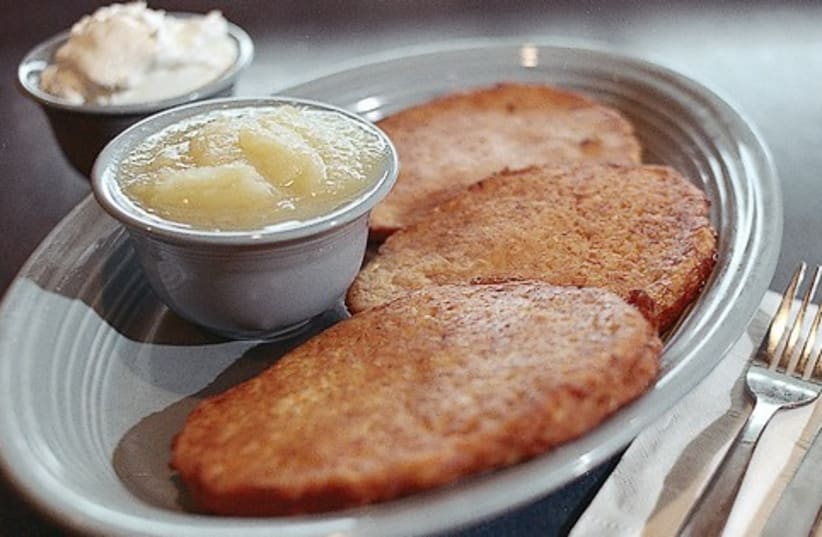Faye Levy is the author of 1,000 Jewish Recipes and Feast from the Mideast.PETITE POTATO FRITTERS WITH WALNUTS These mashed potato fritters make crunchy appetizers for Hanukka parties, or accompaniments for roast or broiled chicken or meat. They can be served with an assortment of dips and condiments, such as spicy cooked tomato-pepper salad (matbuha), Yemenite hot pepper relish (s’hug), sweet chutney, or the traditional applesauce with sour cream or yogurt.Makes about 4 servings.2 boiling potatoes (about 255 gr. or 9 ounces total) 2 large eggs 1⁄2 cup chopped walnuts salt and freshly ground pepper pinch of cayenne pepper (optional) 2 Tbsp. chopped parsley (optional) 5 to 6 cups vegetable oil (for deep frying)Put potatoes in a saucepan, cover with water and add salt. Bring to a boil, cover and simmer about 25 minutes or until tender. Drain, peel and mash. Mix with eggs and walnuts and season with salt and pepper to taste.Heat oil for deep frying to 182ºC (360ºF); if a deep-fat thermometer is not available, test by adding a small piece of potato mixture to oil – it should bubble energetically.Take a round teaspoonful of potato mixture. Dip another teaspoon into hot oil and use it to push mixture off other spoon into oil. Do not push it from high up or oil will splash. Continue making more fritters from remaining mixture but do not crowd them in oil. Fry 2 to 3 minutes or until golden brown on all sides.Transfer to a tray lined with paper towels. Keep warm by placing in a 150ºC (300ºF) oven with door ajar while frying the rest. Serve hot.POTATO CROQUETTES
(crocchette di patate) This recipe is from Classic Italian Jewish Cooking. The croquettes, which are flavored with Parmesan cheese and nutmeg, can be fried in butter, vegetable oil or a mixture of both. To puree the cooked potatoes for these croquettes, author Edda Servi Machlin advises mashing them or using a food mill but not a blender or food processor.Makes 6 servings.1.4 kg. (3 pounds) boiling potatoes 55 gr. (2 ounces or 4 Tbsp.) unsalted butter, plus more for frying if desired 4 Tbsp. freshly grated Italian Parmesan cheese 1 egg 1 egg yolk salt freshly ground white pepper 2 dashes nutmeg 1⁄2 cup unbleached flour vegetable oil for fryingBoil the potatoes in lightly salted water until very tender. Peel and mash, or pass through a vegetable mill. Do not use a blender or food processor.Melt 55 gr. (2 ounces or 4 Tbsp.) butter in a skillet; add the mashed potatoes and stir over low heat until the potatoes are dry and thick. Remove from the heat and let cool for five minutes. Add Parmesan cheese and mix well. Add the egg, egg yolk, nutmeg, salt and pepper to taste and mix very well to prevent bursting during frying.Spread the flour on a working surface. Pour the potato mixture over the flour and quickly knead to incorporate some of the flour. Divide into 3 parts and shape each part into a rope about 2.5 cm. (1 inch) thick. Cut into 6 cm. (21⁄2-inch) pieces and give each an elongated egg shape.Heat butter or oil or a mixture of the two in a skillet to a depth of 2.5 cm. (1 inch) and fry the croquettes over moderately high heat, a few at a time, turning delicately, until golden on all sides.
